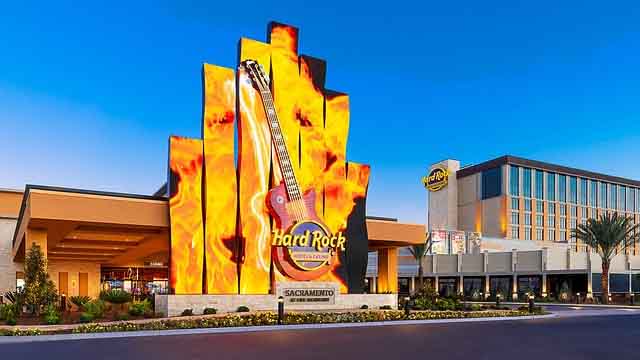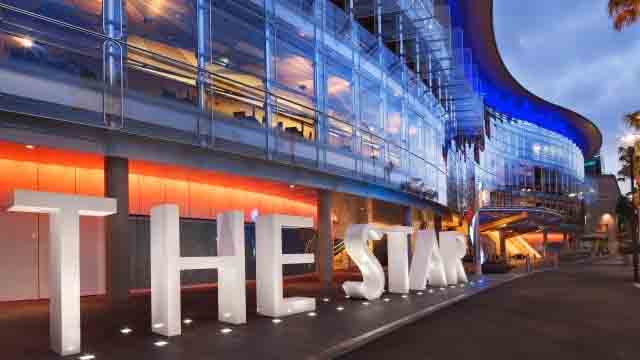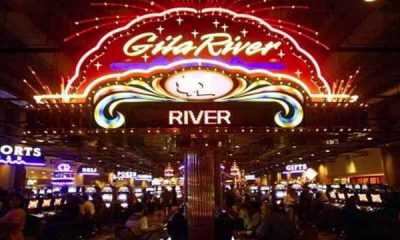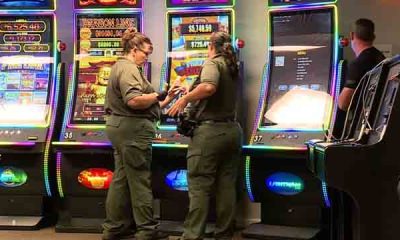headlines
How A Reversal On NJ Sports Betting Case Could Affect Nevada Sportsbook Industry

To the surprise of online gambling operators and prominent legal experts in the field, the U.S. Supreme Court announced that it will review the court ruling that blocks New Jersey based sports gambling. It was the 3rd U.S. Circuit Court of Appeals that ruled against the law initially because they considered it to be in direct contention with the federal law that prohibits state based sports wagering in all but 4 states, The Professional and Amateur Sports Protection Act of 1992 (PASPA).
PASPA has long been considered unconstitutional by legal proponents of the online gambling community and the American Gaming Association which has most of Las Vegas’ major gambling money makers as members. If a law in New Jersey that was ruled in direct opposition of PASPA is reinstated, this likely means it might also lead to national repeal of PASPA and open the option for legal sports betting across all states.
Some might be brought to question if this is even a good thing for Nevada. If all the states are opened up to legalized sports betting at the state level, it certainly means that some of that business might go elsewhere. Industry leaders in Nevada argue the exact opposite.
They posit that if and when the national prohibition on sports betting ends, it would have more of a detrimental effect on the legal offshore gambling websites currently providing sports betting services to US residents than in the four states that are legally allowed to have them currently. They remain confident that Nevada will maintain their status as the top dog in the American sports wagering world.
The infrastructure in Nevada for sports betting is already established and would be able to adapt to a national level much faster than brands just starting out in the industry. Companies like William Hill and MGM who have already embraced online sports wagering, live betting, and mobile optimization of sports gambling are already primed and ready to create a national sports betting brand. People will undoubtedly still flock to Las Vegas for the complete experience at the highest rated sports gambling establishments in the country.
However, the Supreme Court’s review of the New Jersey law that could lead to the repeal of PASPA might go exactly the opposite way. According to one theory by legal experts, Ryan Rodenberg and John Holden, one possible scenario of the review might lead to what’s known in the legal community as “equal sovereignty”. The “equal sovereignty doctrine” that has been used in the US courts before means that the federal government must treat all the states equally.
If the review concludes with the legal opinion that PASPA is constitutional and it does not get repealed, there is a case to be made for equal sovereignty. This means that those states that are currently allowed to regulate sports wagering legally would no longer be exempt from the law that gives them those rights because other states won’t have them either.
To further muddy the waters, the pending GAME Act and/or RAWA would all have a national impact on sports wagering within the US. Regardless of which direction all of this goes, legally licensed offshore gambling sites accepting US players will still be available to offer the same services to American bettors that they’ve been providing thus far.
headlines
Fire Mountain’s Future Burns Bright with Hard Rock Expansion

![]() The Hard Rock Casino just north of Sacramento at Fire Mountain recently announced that it plans to expand.
The Hard Rock Casino just north of Sacramento at Fire Mountain recently announced that it plans to expand.
The casino, located at 3317 Forty Mile Rd, Wheatland, CA, recently acquired 350 acres between the casino and the Toyota Amphitheatre. The land has been undeveloped for years and is now expected to be transformed into a premier tourist destination. The Toyota Amphitheatre is an 18k+ outdoor venue in Yuba County and generally hosts rock and country concerts.
Some proposed ideas for the land include a festival entertainment district, a rodeo space, sports facilities, and resort amenities. There will also likely be retail and dining facilities, walking paths, and a possible stadium or fairground area. District 4 Yuba County Supervisor Gary Bradford stated, “It will bring thousands of jobs and enhance the quality of life for existing residents by increasing local dining, entertainment, and retail options.”
The Hard Rock at Fire Mountain opened in 2019 and has already contributed approximately $2.5 billion to the local economy. The Hard Rock Casino is located on tribal land, but the new developments will not be. Therefore, the community is set to benefit even more from regular sales and property tax revenue.
Officials said construction could take 5-10 years to complete, and the new developments could cost anywhere from $2-4 billion USD. Construction could also begin as early as 2026.
California Local Casinos
California has no casinos, as all are on federal land and governed by the tribes and the federal government. However, there are currently more than 75 tribal casinos in operation in California, all of which are located outside of the major metropolitan areas.
Recently, several tribal casinos have lobbied for more favorable land to be included in their trust, and while approved by the Biden Administration, a new legal battle is ongoing.
Online California Casinos
While casinos located in California are not permitted to offer their services online, offshore casinos have been accepting players for years. Since no specific gambling laws forbid out-of-state online casinos from accepting CA players.
Online casinos typically offer the same gaming options as Vegas casinos, including slots, video poker, keno, blackjack, roulette, and more. However, online casino games often accept lower buy-ins because they are powered by random number generators, not live dealers.
To further gain players’ trust, legitimate casinos will complete compliance checks that test the games for fairness. They also further ensure that online firewalls and encryption methods are working correctly.
headlines
Australia’s Star Entertainment Accepts Bally’s Rescue Bid of $180 Million

![]() Star Entertainment, Australia’s second-largest casino operator, has accepted a rescue package from US-based Bally’s. The package will transfer control of the group and allow the company to stay afloat.
Star Entertainment, Australia’s second-largest casino operator, has accepted a rescue package from US-based Bally’s. The package will transfer control of the group and allow the company to stay afloat.
Star Entertainment has been fighting bankruptcy for years following money laundering allegations, leading to several lawsuits and regulatory scrutiny. The company has been on the brink of collapse for years and is still suspended from trading on the Australian Securities Exchange.
Star Entertainment Group operates three hotel and casino complexes in Australia: The Star Sydney, The Star Gold Coast, and Treasury Casino and Hotel in Brisbane.
Star chief executive Steve McCann has been looking for a long-term solution since he took the job last July. McCann secured an additional loan of $100 million from existing lenders but failed to meet the contingent terms of the loan.
Bally’s currently owns 19 casinos in the United States and other entertainment assets. Soo Kim, Bally’s chairman, agreed to the rescue package in exchange for at least a 50.1% stake in Star. “We are usually the buyer of last resort,” Kim told The Australian Financial Review in March.
Are Offshore Casinos Available Online?
Yes, in the United States, almost all online casinos are offshore because only a handful of states have passed online gambling legislation. Since no federal or state laws prevent Americans from accessing online casino sites, US players can freely wager online with the site of their choice.
However, offshore casinos that operate online are not all the same. Most sites have various banking options US players can access, bonus options, and bet limits. For most players, Bitcoin is the best banking option, allowing for fast transactions that often avoid processing fees.
What Casino Games Can I Play Online?
Online casinos offer the same games you would expect in Vegas, including blackjack, roulette, video poker, and specialty games. Some sites even have live table games where you can choose your seat and bet against a dealer via a video/audio feed.
Online casinos also take it further with tournaments and game-specific competitions. You can also find slot bonuses, hot drop jackpots, progressives, and more. With game libraries that host hundreds of slot titles, seeing the game that suits you is just a few clicks away.
headlines
Lawsuit Challenges Federal Approval Of Casino In Vallejo

 The Scotts Valley Band of Pomo Indians is moving forward with plans for a $700 million casino resort in Vallejo, California, following the US Department of the Interior’s approval to place 160 acres of land into federal trust for the tribe.
The Scotts Valley Band of Pomo Indians is moving forward with plans for a $700 million casino resort in Vallejo, California, following the US Department of the Interior’s approval to place 160 acres of land into federal trust for the tribe.
The proposed development plans include an eight-story, 400,000-square-foot casino, 24 tribal homes, an administration building, and a biological preserve.
However, this project is now facing numerous legal challenges. Two lawsuits have been filed against the US Department of the Interior, claiming that the Scotts Valley Band intends to develop a revenue-generating site far from its tribal homeland and that the federal agency failed to adhere to established environmental laws in approving the project.
Opponents have also expressed concerns about “reservation shopping,” accusing the Scotts Valley Band of attempting to establish a casino near its ancestral lands to maximize potential revenue.
This scenario is reminiscent of other tribal casino projects in Northern California, such as the Koi Nation’s proposed casino near Windsor, which has encountered similar legal and political challenges.
The outcomes of these legal proceedings will significantly impact the future of the Scotts Valley Band’s casino project in Vallejo. They may also set precedents for other tribal gaming initiatives in the region.
In the final days of his presidency, the Biden administration approved off-reservation land for both the Scotts Valley Band of Pomo Indians and the Koi Nation, along with several other tribal requests around the country.
California Casino Laws
The state of California only permits casinos on federal land. Since the state does not allow commercial casinos, all gaming in California is located on land placed into trust by the federal government. Currently, more than 80 tribal casinos in California are owned by 73 of the state’s 109 recognized Indian tribes.
While there are no licensed online casinos, California is one of the many states that allow offshore betting. Since no federal or state laws outlaw online gambling in the state, CA residents and visitors can wager online with offshore casinos, sportsbooks, and poker sites.
Offshore Casino Options
California players over 18 can enjoy online real-money casino games, sports betting, and poker tables from out-of-state sites. Popular casino games include digital slots, video poker, blackjack, roulette, specialty games, and live dealer games.
In addition to endless gaming entertainment, CA players can also take advantage of generous welcome bonuses, online reward programs, digital currency acceptance, and 24/7 access via mobile casino apps.
-

 headlines5 years ago
headlines5 years agoBitcoin Means Smooth Sailing For Offshore Sports Betting Sites
-

 headlines6 years ago
headlines6 years ago‘Game of Thrones’ bettors win big at offshore betting sites
-

 headlines6 years ago
headlines6 years agoHow To Know If An Offshore Gambling Site Can Be Trusted
-

 headlines6 years ago
headlines6 years agoWhy Offshore Betting Sites Will Not Be Affected By New USA Gambling Laws
-

 headlines5 years ago
headlines5 years agoOffshore is Still the Only Political Betting Option for USA Residents
-

 headlines8 years ago
headlines8 years agoUS Sports Betting Market Looking At Expansion
-

 headlines5 years ago
headlines5 years agoMay Madness: Offshore Betting Giant Bovada Debuts NFL Sim Classic Tournament
-

 headlines4 years ago
headlines4 years agoOffshore Gambling Sites Side-Step Legal Challenges Between States and Native American Tribes










